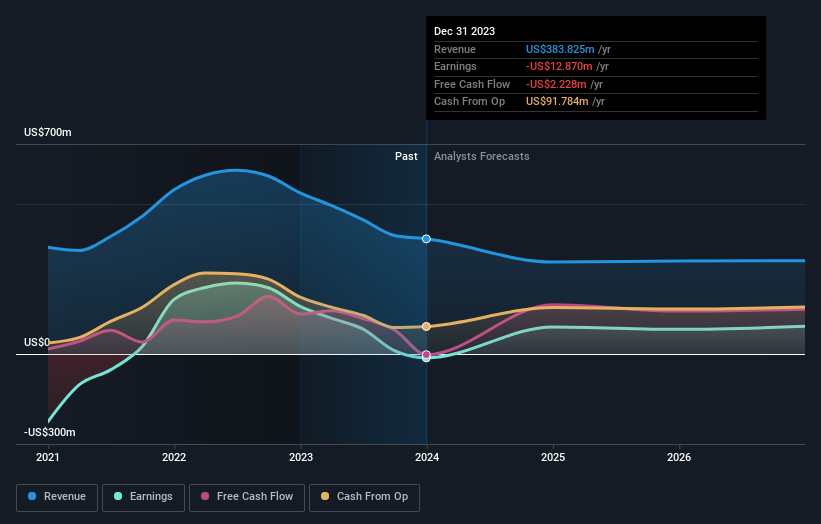With 55% ownership of the shares, Genco Shipping & Trading Limited (NYSE:GNK) is heavily dominated by institutional owners
Key Insights
Given the large stake in the stock by institutions, Genco Shipping & Trading's stock price might be vulnerable to their trading decisions
The top 25 shareholders own 49% of the company
Ownership research along with analyst forecasts data help provide a good understanding of opportunities in a stock
If you want to know who really controls Genco Shipping & Trading Limited (NYSE:GNK), then you'll have to look at the makeup of its share registry. We can see that institutions own the lion's share in the company with 55% ownership. That is, the group stands to benefit the most if the stock rises (or lose the most if there is a downturn).
Since institutional have access to huge amounts of capital, their market moves tend to receive a lot of scrutiny by retail or individual investors. Hence, having a considerable amount of institutional money invested in a company is often regarded as a desirable trait.
Let's delve deeper into each type of owner of Genco Shipping & Trading, beginning with the chart below.
See our latest analysis for Genco Shipping & Trading
What Does The Institutional Ownership Tell Us About Genco Shipping & Trading?
Institutional investors commonly compare their own returns to the returns of a commonly followed index. So they generally do consider buying larger companies that are included in the relevant benchmark index.
We can see that Genco Shipping & Trading does have institutional investors; and they hold a good portion of the company's stock. This can indicate that the company has a certain degree of credibility in the investment community. However, it is best to be wary of relying on the supposed validation that comes with institutional investors. They too, get it wrong sometimes. If multiple institutions change their view on a stock at the same time, you could see the share price drop fast. It's therefore worth looking at Genco Shipping & Trading's earnings history below. Of course, the future is what really matters.
Since institutional investors own more than half the issued stock, the board will likely have to pay attention to their preferences. Hedge funds don't have many shares in Genco Shipping & Trading. BlackRock, Inc. is currently the company's largest shareholder with 8.3% of shares outstanding. With 6.4% and 5.4% of the shares outstanding respectively, Dimensional Fund Advisors LP and George Economou are the second and third largest shareholders. In addition, we found that John Wobensmith, the CEO has 1.1% of the shares allocated to their name.
A deeper look at our ownership data shows that the top 25 shareholders collectively hold less than half of the register, suggesting a large group of small holders where no single shareholder has a majority.
While it makes sense to study institutional ownership data for a company, it also makes sense to study analyst sentiments to know which way the wind is blowing. There are a reasonable number of analysts covering the stock, so it might be useful to find out their aggregate view on the future.
Insider Ownership Of Genco Shipping & Trading
While the precise definition of an insider can be subjective, almost everyone considers board members to be insiders. Management ultimately answers to the board. However, it is not uncommon for managers to be executive board members, especially if they are a founder or the CEO.
Most consider insider ownership a positive because it can indicate the board is well aligned with other shareholders. However, on some occasions too much power is concentrated within this group.
We can report that insiders do own shares in Genco Shipping & Trading Limited. It has a market capitalization of just US$898m, and insiders have US$63m worth of shares, in their own names. It is good to see some investment by insiders, but it might be worth checking if those insiders have been buying.
General Public Ownership
With a 38% ownership, the general public, mostly comprising of individual investors, have some degree of sway over Genco Shipping & Trading. While this group can't necessarily call the shots, it can certainly have a real influence on how the company is run.
Next Steps:
While it is well worth considering the different groups that own a company, there are other factors that are even more important. For example, we've discovered 1 warning sign for Genco Shipping & Trading that you should be aware of before investing here.
If you are like me, you may want to think about whether this company will grow or shrink. Luckily, you can check this free report showing analyst forecasts for its future.
NB: Figures in this article are calculated using data from the last twelve months, which refer to the 12-month period ending on the last date of the month the financial statement is dated. This may not be consistent with full year annual report figures.
Have feedback on this article? Concerned about the content? Get in touch with us directly. Alternatively, email editorial-team (at) simplywallst.com.
This article by Simply Wall St is general in nature. We provide commentary based on historical data and analyst forecasts only using an unbiased methodology and our articles are not intended to be financial advice. It does not constitute a recommendation to buy or sell any stock, and does not take account of your objectives, or your financial situation. We aim to bring you long-term focused analysis driven by fundamental data. Note that our analysis may not factor in the latest price-sensitive company announcements or qualitative material. Simply Wall St has no position in any stocks mentioned.

 Yahoo Finance
Yahoo Finance 

